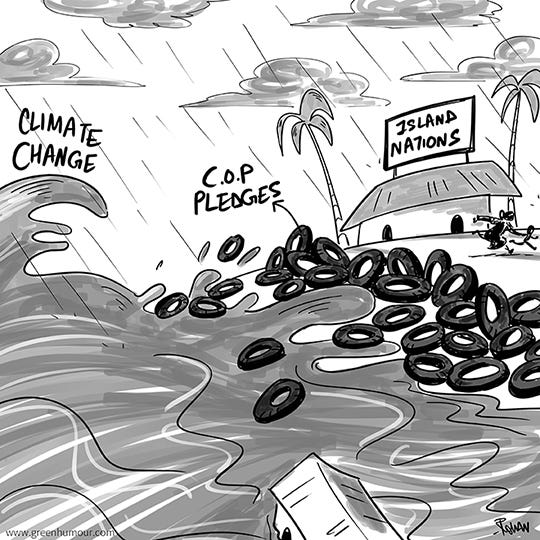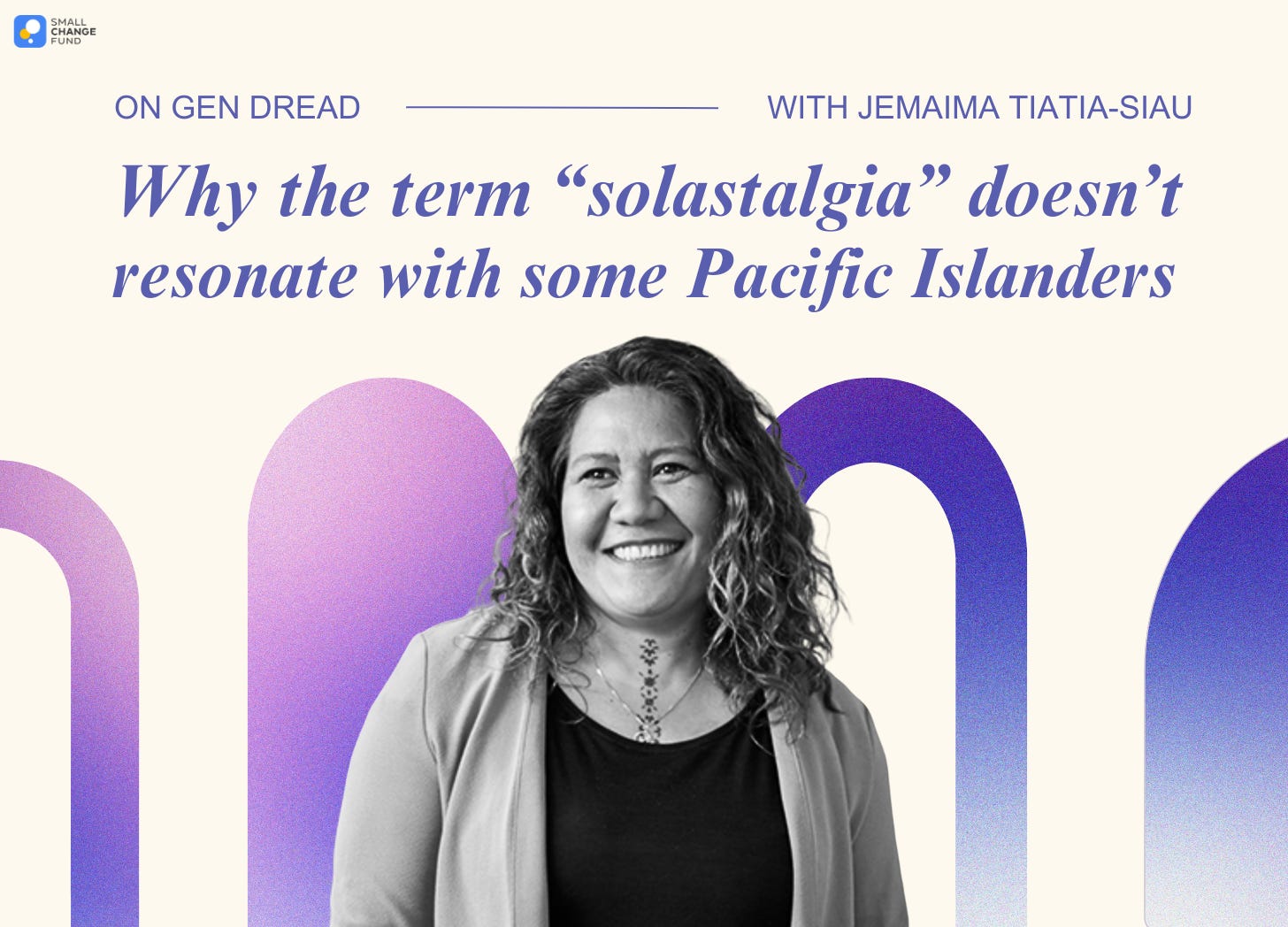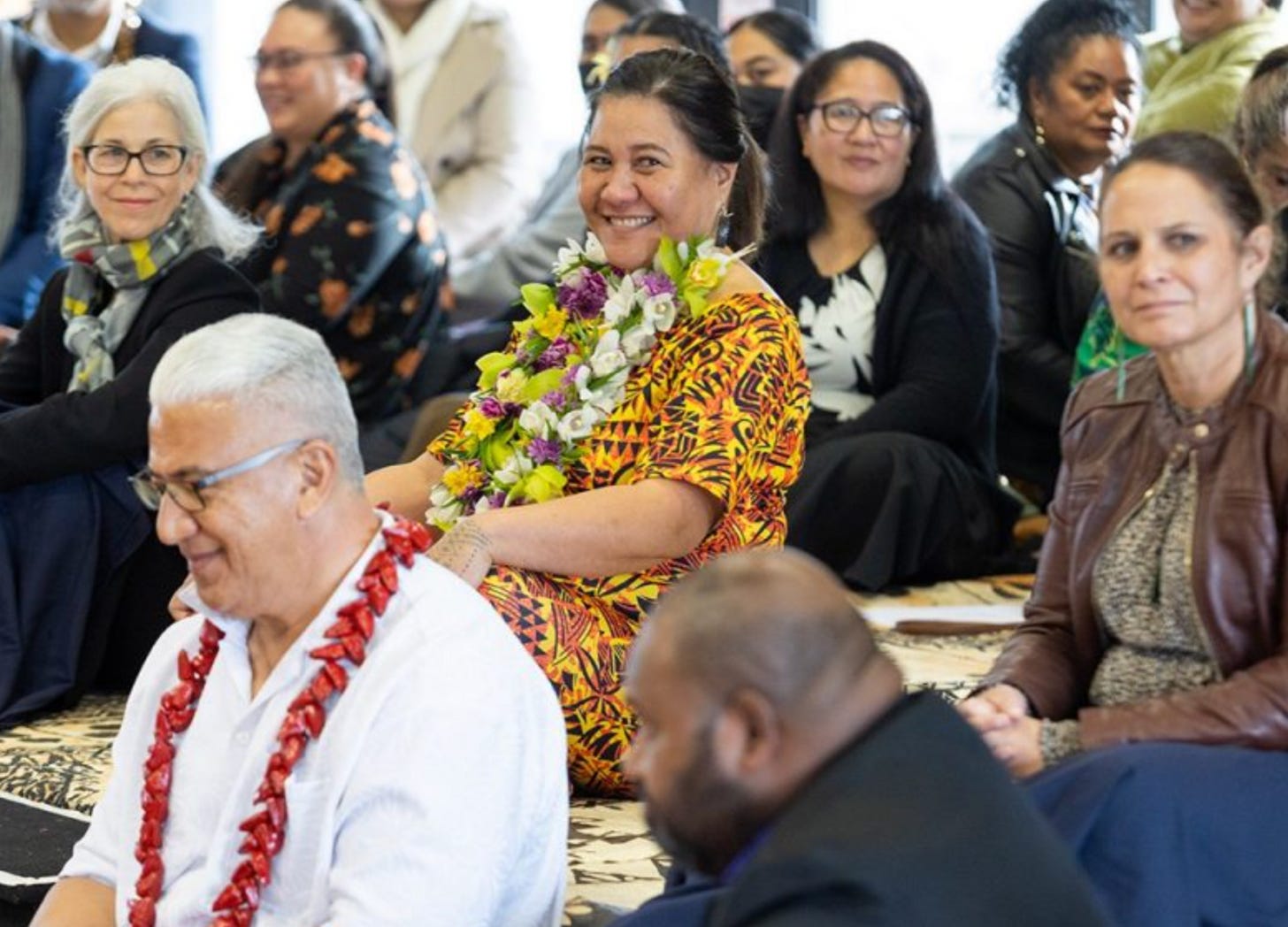Why the term “solastalgia” doesn’t resonate with some Pacific Islanders
Jemaima Tiatia-Siau on the need for a more expansive understanding of life and loss
Sometimes we talk about solar power, sometimes we talk about wind power, but none of that stuff works without community power. If Gen Dread’s helped you feel less alone in the climate crisis, we’d love it if you’d consider joining our small but mighty fortress of folks whose donations are helping us do this work. Become a paid subscriber or support Gen Dread with a one-time donation through our partner, Small Change Fund. Thanks for being here.
You may have encountered the term solastalgia, which originally came from Australia. A philosopher named Glenn Albrecht (who we did a 2-part interview with in 2021) came up with the eye-catching word in 2005 in the context of describing impacts of the mining industry on people who lived nearby. The term conveys the sense of place-based loss people feel when their home is being threatened or destroyed. Often described as “homesickness one can feel when still at home”, Albrecht writes about it as “the pain or distress caused by the ongoing loss of solace and the sense of desolation connected to the present state of one’s home and territory… the existential and ‘lived experience’ of negative environmental change, manifest as an attack on one’s sense of place.” It’s become a ubiquitous concept in the climate and mental health space, and its popularity has shown that for many people, in many situations, it is a useful and valuable addition to our lexicon.
But Jemaima Tiatia-Siau explains that, as with so many Western paradigms, it excludes and misrepresents many people in the Global South – Pacific Islanders in particular – and fails to capture some of the crucial dimensions in which they experience being alive. You can read some of her work on that topic here. Jemaima is a professor at the School of Māori Studies and Pacific Studies at the University of Auckland. She is of Samoan descent and her work centres around Pacific peoples’ mental health and wellbeing, including the systemic injustices that contribute to their struggle for emotional equilibrium.
Could you explain the term solastalgia and why Pacific peoples are not being served by this concept?
In my exploration around climate change and mental health and Pacific perspectives, I was hell-bent on the term solastalgia being appropriate and adaptable. So we tested it….and it isn't. So that really brought into perspective the entire problem for me, which is that non-Pacific or any Western framework or paradigm assumes that it's good for all. And that just wasn't the case.
A lot of psychological terms such as eco-anxiety don’t sit well. Which makes complete sense when English is not your first language anyway. The categorization of certain populations – Asians, Pacific Islanders, and others – assumes that everyone is homogenous, but they're not. It’s the same for terminology and the way people express their feelings or think about the world, their worldviews, and the diverse lenses that exist. And so it was important for us to really reconfigure the major discourse and the Western framing around what climate change and mental health would be for Pacific peoples.
For instance: land. We call it the motherland and even though I'm in the diaspora, Samoa will always be my motherland and it literally is that. When you're born, you're born from the land and you consider the environment your ancestor and for some, a deity, and that needs to be preserved and embraced and not feared. But with all the anxiety, with the trauma around loss of lives and homes, a word like solastalgia just doesn't do it justice.
So it seems like the term solastalgia is not properly encompassing the vastness of people's relationship with land and everything else outside.
Right. In our creation stories – stories that many, many people and communities have – it’s all about the environment and mother and father and siblings and the underworld and everything above and below. It has life. Everything has life. And when a part of that is killed in some way or poisoned or threatened, it's like losing your arm or your heart or your mother or father, that's how deep it is. People are feeling some really deep emotional and mental distress that Western psychological frameworks and psychiatric measures can't capture.
So many people have their eyes on the Pacific, but no one has really said, “well, Pacific, how do you feel about this?” It's a top-down approach. And that voice is completely missing in a lot of the literature and research. So right now it’s growing – there’s almost a reclaiming and a decolonization of existing thought, and it only can happen if we have the workforce and if the emerging researchers in this field can grow that and are able to elevate our presence and raise the volume of our voices. There are lots of research groups around the world looking into this type of stuff. But it's like, who have you got on your team? Who is leading? Are you growing? And if you're intentional and authentic to what you're trying to say and do for the Pacific, are you and your team actually reflective of the Pacific? Are you growing Pacific research leaders in this area? What literature are you looking at? Is it very Global North-oriented? How about the voices in the South?
Did the people you spoke to express what bothers them about terms like solastalgia?
Pacific people have spiritual visitations, and it could be your ancestors or even your descendants visiting you. But it's your people. In Western terms, this could be diagnosed as schizophrenia or psychosis or hallucinations, when in actual fact that's an everyday part of some of our lives – and the same could be said for the way we interact or engage or live through our environment. For instance, the ocean that has torn through villages and towns and cities is the same ocean that when you're deeply distressed, you go to and you get in the water and you just wash it away because water holds memory, water holds voices and it travels and it's cleansing. It can be Christianized or it could just be traditional knowledge, but it's personal, right? So it's trying to say all that without boxing it in a term like solastalgia. Solastalgia is yearning for that home that once was, while you're still at home. But it's more than that. You're still at home and you're going through grieving, trauma, healing, in specific ways that resonate with those communities.
Did you sense there could be a way of looking at these things that would encapsulate a more expansive worldview?
Absolutely. I mean, we need to be at the decision-making tables, particularly in this area. We need to be co-designing research agendas in this area. When it's a study alongside a population, they need to be front and centre. I consider it a cultural humility. Like, I'm a professor, I’m Western-trained, but completely get rid of that and bring humility to the engagement. And then you're able to obviously elicit deeper information. Then it helps that these people see themselves standing in front of them. The talking through stuff is a whole lot easier and there isn't any whitesplaining or mansplaining. It's just automatic. The tough thing is that we know this, but when we have to translate it into a peer-reviewed article, it's like, argh, we're falling back into this rut again. But at the same time, this rut is the people that we want to educate or raise awareness with. So yes, give the resources, be an enabler of that, but be willing to step out of the way for that community to be able to do things as best as they can. So it's community solutions, really grassroots level, and a bottom-up approach.
What are some of the challenges in getting Pacific communities to that table and into those positions of co-creation?
Racism. And the inequity around resources. It just blows my mind because they pour lots and lots of aid into the Pacific, but there's always another agenda. Look how rich the Pacific is in resources. The Cook Islands with their nodules and potential deep sea mining, which is just crazy. Also, ensuring that our post-graduates see opportunity here. What are the research gaps? How do we get Pacific peoples excited? It's one thing to be excited about climate change and one thing to be excited about mental health, but both!
How do you handle that tension between working within this white colonial system while not really wanting to participate in it…but knowing you have to in order to reach the people you want to reach?
Negotiating personhood and multiple spaces is something I’ve been born into. I mean, I'm a brown woman who identifies with the rainbow community, living in the diaspora – so you learn to start negotiating and you quickly learn where you don't compromise. I mean, controversy just seems to follow me everywhere I go in terms of research. One of the reviews for that article in particular, they slammed me. How dare you! Blah, blah, blah. And I was like, oh, here we go. And I'm going to be straight up here: a lot of our knowledge stems from colonization and institutional racism. So it does impact on my wellbeing. But when I went to the islands to do my research, I ensured that I had Cook Islanders on my team and that I was progressing them, putting them as first authors, putting them on publications. Those little things make a huge difference to their academic careers. So it's more than just solastalgia. It's everything else around it. The more voices we have, the better and more accurate. And then probably, the more relevant and targeted our approaches will be to solving some of it.
How do you cope with those days where it feels hard and you’re like, what am I even doing?
In the last few years, I’ve started saying no a lot. I started prioritizing my own wellbeing and realizing that work is one thing, but it's not everything, and there's more to life than climbing the ranks in academia. So, turning off, switching off, and just spending time with loved ones. Or, going to the ocean. It really helps me recalibrate and get rid of negative talk. Just sitting under the water and all you hear is how it would be in your mother's womb. Some people are sky people. Some are land people. I'm a water girl.
If you liked reading this, feel free to click the ❤️ button on this post so more people can discover it on Substack 🙏🏼
Making Waves
The Existential Toolkit for Climate Justice Educators: How to Teach in a Burning World is a collection of galvanizing and practical essays and resources for developing emotional and existential tenacity in college classrooms that will equip both educators and their students with tools for advancing climate justice. Many of the contributors have made extra resources accessible on this website.
Editor and climate psychologist Steffi Bednarek has co-created a new anthology called Climate, Psychology, and Change. It brings together a diverse group of psychologists and mental health practitioners, and explores what decolonizing therapy and re-visioning the field could look like. You can preorder the book here.
‘Till next time!








The most relatable part of this interview, as someone working in food justice / food security, was: “The tough thing is that we know this, but when we have to translate it into a peer-reviewed article, it's like, argh, we're falling back into this rut again.” !! When trying to undo harms from the system in place, is incredibly frustrating and uncomfortable to use the tools that reinforce said system... Definitely appreciate reading Jemaima’s perspective!
Solastalgia is so abstract and academic and kind of wistful and romantic. I don’t see how it helps anyone facing existential threat make sense of it and advocate - as Pacific civil society leaders have done so strongly.